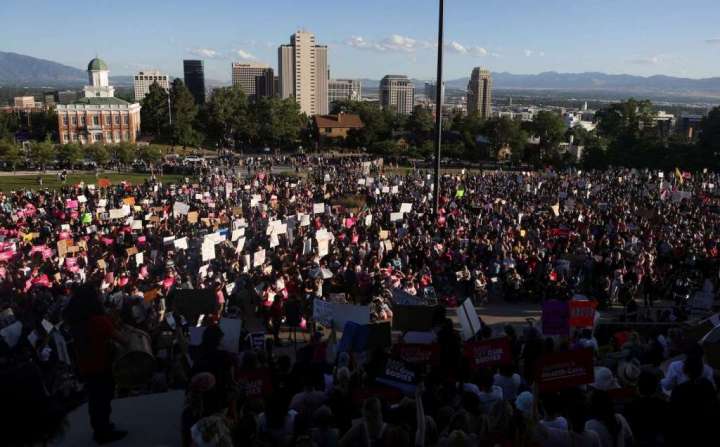The Planned Parenthood Association of Utah filed a lawsuit Saturday to block the state’s “trigger ban” on abortion, which went into effect shortly after the U.S. Supreme Court overturned Roe v. Wade.
Planned Parenthood sues to halt Utah’s ‘trigger law’ abortion ban

Utah is one of 13 states in the country with trigger bans that were designed to prohibit abortion if Roe were to fall. The state’s ban took effect Friday evening, after its legislative general counsel certified the Supreme Court decision.
Although the lawsuit to block the ban was filed the following day, Karrie Galloway, president and chief executive of the Planned Parenthood Association of Utah (PPAU), said the organization had been planning for legal action long before the Supreme Court ruling.
“We’ve been on notice for a while,” Galloway told The Washington Post. “We’ve been on notice since the last administration wiggled their way into three court nominations. We knew what was the writing on the walls.”
Utah’s trigger ban, which the legislature passed in 2020, prohibits abortions with limited exceptions, such as if the procedure is necessary to prevent a pregnant person’s death or if a person is pregnant as a result of incest or rape.
With the law in effect, PPAU said in its court filing that it had canceled abortions for about a dozen patients Saturday. The organization has three health clinics that were licensed to provide abortion services, according to Galloway.
“We couldn’t help them today,” she said. “And the people next week are going to be dealing with the same thing if we don’t get a temporary restraining order and put this law on hold.”
A person convicted of violating the trigger law may face one to 15 years in prison, a fine of up to $10,000 or both.
According to the lawsuit, the state’s ban harms people experiencing hardship — including poverty, addiction and abusive relationships.
“If left in place, the Criminal Abortion Ban will be catastrophic for Utahns,” the document said. “The Act will force some Utahns seeking abortion to instead carry pregnancies to term against their will, with all of the physical, emotional, and financial costs that entails.”
In addition to naming the state, PPAU listed Gov. Spencer Cox (R), Attorney General Sean Reyes (R) and Division of Occupational and Professional Licensing Director Mark Steinagel as defendants in the lawsuit.
In a statement to the Salt Lake Tribune on Friday, Reyes said the Supreme Court ruling was “clear,” adding that he would be ready to defend the trigger law against legal action.
“It has returned the question of abortion to the states. And the Utah legislature has answered that question,” Reyes said in the statement. “My office will do its duty to defend the state law against any and all potential legal challenges.”
Richard Piatt, communications director for Reyes, said the attorney general’s office had no comment Saturday evening.
Cox and Utah Lt. Gov. Deidre Henderson (R) said in a statement Friday that they “wholeheartedly support” the Supreme Court’s ruling.
“As pro-life advocates, this administration is equally committed to supporting women and families in Utah,” the joint statement said. “We all need to do more to support mothers, pregnant women, and children facing poverty and trauma.”
The governor’s office did not respond immediately to a request for comment Saturday evening.
Attorneys from the Salt Lake City-based firm Zimmerman Booher, the Planned Parenthood Federation of America and the ACLU of Utah will represent PPAU in the case.
Valentina De Fex, a senior staff attorney for the ACLU of Utah, said in a statement that the organization was proud to continue “the fight for reproductive justice” in the state.
“The fight to preserve abortion access is unfortunately not a new one for Utahns,” De Fex’s statement said. “Yesterday’s decision by the U.S. Supreme Court was devastating. Still, it did not erode the rights that exist under our state constitution to make decisions regarding whether and when to become a parent.”






